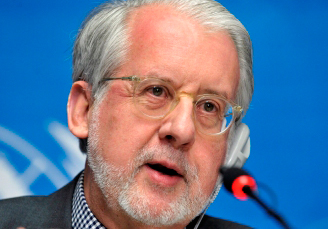The ICJ today called on the Government of Myanmar to allow the United Nations (UN) Special Rapporteur on Myanmar (photo) full and unhindered access to the country.
The UN Human Rights Council on 2 October unanimously deplored the violent crackdown on peaceful protesters and dispatched its expert on Myanmar to carry out an urgent mission to the country.
“The 47 member states of the UN Human Rights Council that by consensus deplored the violent repression of peaceful demonstrations, represent all regions of the world, including two of Myanmar’s neighbours, China and India, and fellow ASEAN members Indonesia and the Philippines”, said Nicholas Howen, Secretary-General of the ICJ.
“The international community, through the Human Rights Council, has sent a clear message that the suppression of the right of the Burmese people to freely and peacefully demonstrate and express their views, is unacceptable. The Council has followed the lead set by ASEAN Foreign Ministers meeting in New York who expressed revulsion at the crackdown”, added Nicholas Howen.
The ICJ urged member states of the UN, the President of the Council and the High Commissioner for Human Rights to act swiftly to persuade the Myanmar authorities to allow the Special Rapporteur, Professor Paulo Sergio Pinheiro, into the country.
“Given that the Myanmar Government has refused Professor Pinheiro permission to enter the country for almost four years, he will need intense political support to ensure the will of the Human Rights Council is carried out,” said Nicholas Howen.
The Special Rapporteur will need to have full and unhindered access to all parts of the country and to meet in private with anyone he considers necessary to interview, including any detainee.
“If the Special Rapporteur is denied full access, this would be a direct challenge to the authority of the United Nations and the Council would need to reconvene swiftly to consider its response”, added Nicholas Howen.
The ICJ urged that the Special Rapporteur carries out his mission urgently and that he should be asked to report back to the Council swiftly, rather than waiting until the December session of the Council.
“The human rights and political crisis in Myanmar continues. The Council should closely and continuously scrutinise events as they rapidly unfold, especially with reports that arrests and other violations are continuing”, said Nicholas Howen.
The ICJ added that the regular update the Special Rapporteur is due to give to the UN General Assembly in October is not a substitute for the Council exercising its leading role, including hearing and acting on the recommendations of the Special Rapporteur.
The political reverberations are being felt well beyond the borders of Myanmar, as more Burmese refugees are fleeing. The ICJ urged the governments of neighbouring countries to permit Burmese refugees to enter, seek asylum and not to forcibly repatriate them.
“The events in Myanmar raise major concerns both for international peace and security and for the protection of human rights. The UN Security Council and the Human Rights Council both have a responsibility to act. Their response should be complementary and mutually reinforcing. Indeed, we witness a crisis of such proportions, that all parts of the United Nations human rights and political machinery have a role”, continued Nicholas Howen.
In the resolution passed at the Special Session convened on 2 October 2007 to consider recent events in Myanmar, the Human Rights Council called on the Myanmar Government to desist from further violence, lift all restrictions on political activities and freedoms and release those arrested and detained following the protests, as well as all political prisoners, including Daw Aung San Suu Kyi. Unfortunately, the Council did not call on the Government to provide details of the numbers and circumstances of those killed and the numbers and fate of those injured and/or arrested.
The Council also called on the Government to investigate and bring to justice perpetrators of recent and past human rights violations.
“Some of the gross human rights violations we have witnessed in recent days may amount to crimes under international law. Those who carried out, ordered or acquiesced in such acts are individually and criminally responsible in Myanmar and internationally and must be held accountable”, said Nicholas Howen.
The Council also urged the Government of Myanmar to engage urgently in a reinvigorated national dialogue with a view to achieving national reconciliation and democratization.
Myanmar-Human Rights Council expert-press release-2007 (text, PDF)
Photo by UN





